
Waffenfarbe
Encyclopedia
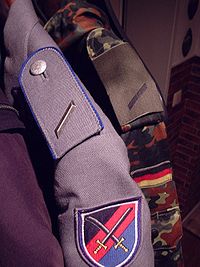
Piping (sewing)
In sewing, piping is a type of trim or embellishment consisting of a strip of folded fabric inserted into a seam to define the edges or style lines of a garment or other textile object. Usually the fabric strip is cut on the bias, and often it is folded over a cord...
(coloured edging) around the shoulder boards or shoulder straps and - for enlisted ranks - of the piping around the collar and the garrison cap
Garrison cap
A Side cap is a foldable military cap with straight sides and a creased or hollow crown sloping to the back where it is parted. It is known as a garrison cap , a wedge cap , or officially field service cap, , but it is more generally known as the side cap.It follows the style which...
(schiffchen). (In the latter places, NCO's wear cords of dark gold, officers silver, and generals gold.)
Army
The German ArmyGerman Army
The German Army is the land component of the armed forces of the Federal Republic of Germany. Following the disbanding of the Wehrmacht after World War II, it was re-established in 1955 as the Bundesheer, part of the newly formed West German Bundeswehr along with the Navy and the Air Force...
uses a waffenfarben scheme of colours to indicate troop types. The colours appear on the collar patch and as piping around the shoulder boards or straps showing a soldier’s rank.
Although soldiers’ berets are also coloured, the colours are slightly less differentiated than the waffenfarben, and corps or troop function is indicated by a beret badge rather than beret colour.
Air force
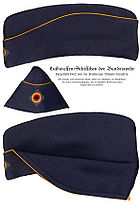
Luftwaffe
Luftwaffe is a generic German term for an air force. It is also the official name for two of the four historic German air forces, the Wehrmacht air arm founded in 1935 and disbanded in 1946; and the current Bundeswehr air arm founded in 1956....
only uses a small spectrum of colours for the purpose. While the normal colour for the air force is a golden yellow, officers in the general staff service (today there is no general staff as such) wear wine-red and generals, bright red. Generals’ and general staff service officers' collar patches (Kragenspiegel) also differ from the normal air force design, being the same the army wears.
1935-45, the air force used a larger number of colours, including bi-coloured (see below).
Navy
The German NavyGerman Navy
The German Navy is the navy of Germany and is part of the unified Bundeswehr .The German Navy traces its roots back to the Imperial Fleet of the revolutionary era of 1848 – 52 and more directly to the Prussian Navy, which later evolved into the Northern German Federal Navy...
does not use function-specific colours to distinguish between corps. This is done instead by various emblems above the rank stripes on the sleeves.
Some Waffenfarben used by the Reichsheer 1921-35
| Regiment or Battalion type | Colour |
|---|---|
| General Officers General (Germany) General is presently the highest rank of the German Army and Luftwaffe . It is the equivalent to the rank of Admiral in the German Navy .-Early history:... Artillery Artillery Originally applied to any group of infantry primarily armed with projectile weapons, artillery has over time become limited in meaning to refer only to those engines of war that operate by projection of munitions far beyond the range of effect of personal weapons... Ordnance Ordnance Ordnance may refer to:*Military:**Weapons and ammunition**Military logistics, especially provision of weapons and ammunition**Ordnance weapon, a personal weapon issued to a member of a military unit... troops |
Hochrot (scarlet) |
| Staff Corps of the Reichswehr Reichswehr The Reichswehr formed the military organisation of Germany from 1919 until 1935, when it was renamed the Wehrmacht .... Veterinary service |
Karmesin (carmine) |
| Infantry Infantry Infantrymen are soldiers who are specifically trained for the role of fighting on foot to engage the enemy face to face and have historically borne the brunt of the casualties of combat in wars. As the oldest branch of combat arms, they are the backbone of armies... |
White |
| Cavalry Cavalry Cavalry or horsemen were soldiers or warriors who fought mounted on horseback. Cavalry were historically the third oldest and the most mobile of the combat arms... |
Golden yellow |
| Jäger (light infantry) Jäger (military) Jäger is a term that was adopted in the Enlightenment era in German-speaking states and others influenced by German military practice to describe a kind of light infantry, and it has continued in that use since then.... |
Dark green |
| Signals Military communications Historically, the first military communications had the form of sending/receiving simple signals . Respectively, the first distinctive tactics of military communications were called Signals, while units specializing in those tactics received the Signal Corps name... |
Light brown |
| Pioniere (Engineers) | Black |
| Transport Transport Transport or transportation is the movement of people, cattle, animals and goods from one location to another. Modes of transport include air, rail, road, water, cable, pipeline, and space. The field can be divided into infrastructure, vehicles, and operations... (horse-drawn) |
Light blue |
| Motor transport | Rose-pink |
| Medical service | Dark blue |

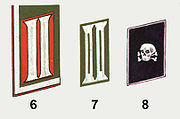
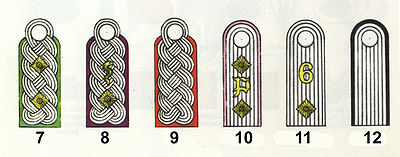
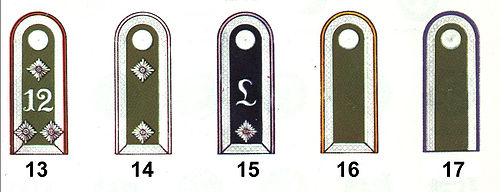
Some Waffenfarben used by the Wehrmacht Heer 1935-45
| Regiment, Battalion or Staff Corps type | Colour |
|---|---|
| General Officers General (Germany) General is presently the highest rank of the German Army and Luftwaffe . It is the equivalent to the rank of Admiral in the German Navy .-Early history:... Artillery Artillery Originally applied to any group of infantry primarily armed with projectile weapons, artillery has over time become limited in meaning to refer only to those engines of war that operate by projection of munitions far beyond the range of effect of personal weapons... Assault guns (Sturmgeschütze) Heavy Flak Mapping and Surveying troops |
Hochrot (scarlet) |
| General Staff Corps Officers War Academy Veterinary service |
Karmesin (carmine) |
| Infantry Infantry Infantrymen are soldiers who are specifically trained for the role of fighting on foot to engage the enemy face to face and have historically borne the brunt of the casualties of combat in wars. As the oldest branch of combat arms, they are the backbone of armies... Motorized infantry (to 7/43) Panzergrenadier-Rgt. Grossdeutschland Fusilier regiments Machine gun battalions Mortar battalions Infantry guns Light Flak |
White |
| Jäger (light infantry) Jäger (military) Jäger is a term that was adopted in the Enlightenment era in German-speaking states and others influenced by German military practice to describe a kind of light infantry, and it has continued in that use since then.... Gebirgsjäger Gebirgsjäger Gebirgsjäger, in English Mountain Riflemen, is the German designation for mountain infantry. The word Jäger is the traditional German term for rifleman... (mountain troops) Skijäger (ski troops) |
Hellgrün (lit. "light green", actually a medium green) |
| Panzergrenadier Panzergrenadier is a German term for motorised or mechanized infantry, as introduced during World War II. It is used in the armies of Austria, Chile, Germany and Switzerland.-Forerunners:... s (armored infantry)(from 10/42) Motorcycle battalions (1939–41) Reconnaissance Battalion Grossdeutschland (1942–43) |
Wiesengrün (meadow green) |
| Panzer Panzer A Panzer is a German language word that, when used as a noun, means "tank". When it is used as an adjective, it means either tank or "armoured" .- Etymology :... s Panzerjäger (tank destroyers) Panzerschützen (armored rifles) (to 7/43) Armored reconnaissance (1934–37; 1943–44) Armored recon battalions, Pz.Div 1-3 and 5 Armored signals (1934–37) Motorized artillery observers (1938–41) Vehicle maintenance battalions |
Rose-pink |
| Cavalry Cavalry Cavalry or horsemen were soldiers or warriors who fought mounted on horseback. Cavalry were historically the third oldest and the most mobile of the combat arms... 24th Panzer Div (ex- 1st Cavalry) Armored reconnaissance units with cavalry traditions Reconnaissance Reconnaissance Reconnaissance is the military term for exploring beyond the area occupied by friendly forces to gain information about enemy forces or features of the environment.... Armored reconnaissance (1937–1939; 1944–45) Motorized reconnaissance (1937–41; 1943–45) Motorcycle battalions (1937–39) Fusilier (scout) battalions |
Golden yellow |
| Armored reconnaissance (1939–43) Motorized reconnaissance (1941–43) Motorcycle battalions (1941–43) |
Copper-brown |
| Signals Military communications Historically, the first military communications had the form of sending/receiving simple signals . Respectively, the first distinctive tactics of military communications were called Signals, while units specializing in those tactics received the Signal Corps name... Armored signals (1937–45) |
Lemon yellow |
| Pioniere (Combat engineers) Assault engineers Armored engineers Fortress engineers Railway engineers |
Black |
| Bautruppen (Construction engineers) | Light brown |
| Chemical troops Chemical warfare Chemical warfare involves using the toxic properties of chemical substances as weapons. This type of warfare is distinct from Nuclear warfare and Biological warfare, which together make up NBC, the military acronym for Nuclear, Biological, and Chemical... Smoke troops Rocket artillery Nebelwerfer The Nebelwerfer was a World War II German series of weapons originally designed to deliver chemical weapons. They were initially developed by and assigned to the Wehrmacht's so-called Chemical Troops ... Judicial service |
Bordeaux red |
| Military Police Military police Military police are police organisations connected with, or part of, the military of a state. The word can have different meanings in different countries, and may refer to:... |
Orange-yellow |
| Transport Transport Transport or transportation is the movement of people, cattle, animals and goods from one location to another. Modes of transport include air, rail, road, water, cable, pipeline, and space. The field can be divided into infrastructure, vehicles, and operations... |
Light blue |
| Medical service | Cornflower blue |
| Recruiting (to 1942) Ordnance Ordnance Ordnance may refer to:*Military:**Weapons and ammunition**Military logistics, especially provision of weapons and ammunition**Ordnance weapon, a personal weapon issued to a member of a military unit... troops Engineer officers' academy |
Orange |
| War correspondents Propaganda troops |
Light Grey |
| Army administration (Heeresbeamten) | Dark green with a secondary colour according to the different services |
| Lead Specialists (Sonderführer) | Grey-blue |
| Special Troop Services (Truppensonderdienst) (from 1944) | Bright blue |
| Chaplain Chaplain Traditionally, a chaplain is a minister in a specialized setting such as a priest, pastor, rabbi, or imam or lay representative of a religion attached to a secular institution such as a hospital, prison, military unit, police department, university, or private chapel... s |
Purple |
Some Waffenfarben used by the Luftwaffe 1935-45
| Corps or troop function | Colour |
|---|---|
| Generals General (Germany) General is presently the highest rank of the German Army and Luftwaffe . It is the equivalent to the rank of Admiral in the German Navy .-Early history:... (if not mentioned below) Surgeons general |
White |
| Reich Air Ministry Reich Air Ministry thumb|300px|The Ministry of Aviation, December 1938The Ministry of Aviation was a government department during the period of Nazi Germany... (to 30 June 1939) Luftwaffe construction Construction In the fields of architecture and civil engineering, construction is a process that consists of the building or assembling of infrastructure. Far from being a single activity, large scale construction is a feat of human multitasking... units Luftschutz Civil defense Civil defense, civil defence or civil protection is an effort to protect the citizens of a state from military attack. It uses the principles of emergency operations: prevention, mitigation, preparation, response, or emergency evacuation, and recovery... motorized units |
Black |
| General staff General Staff A military staff, often referred to as General Staff, Army Staff, Navy Staff or Air Staff within the individual services, is a group of officers and enlisted personnel that provides a bi-directional flow of information between a commanding officer and subordinate military units... officers Veterinary Veterinary medicine Veterinary Medicine is the branch of science that deals with the prevention, diagnosis and treatment of disease, disorder and injury in non-human animals... units (NCOs and enlisted) |
Karmesin (carmine) |
| Flying and Paratrooper Paratrooper Paratroopers are soldiers trained in parachuting and generally operate as part of an airborne force.Paratroopers are used for tactical advantage as they can be inserted into the battlefield from the air, thereby allowing them to be positioned in areas not accessible by land... s Schools (if not mentioned below) Military personnel of the weather service |
Golden yellow |
| Flak Flak schools Military personnel of the Reichsanstalt für Luftschutz |
Bright red |
| Signals Signals school and training units |
Light brown (to 30 Sept 1936) |
| Golden brown (from 1 Oct 1936) | |
| Medical Medicine Medicine is the science and art of healing. It encompasses a variety of health care practices evolved to maintain and restore health by the prevention and treatment of illness.... Medical academy |
Dark blue |
| Luftwaffe administration Military administration Military administration identifies both the techniques and systems used by military departments, agencies, and Armed Services involved in the management of the armed forces... |
Dark green with a secondary colour according to the different services |
| Air traffic control Air traffic control Air traffic control is a service provided by ground-based controllers who direct aircraft on the ground and in the air. The primary purpose of ATC systems worldwide is to separate aircraft to prevent collisions, to organize and expedite the flow of traffic, and to provide information and other... Air traffic control school |
Light green |
| Luftwaffe reserve Military reserve force A military reserve force is a military organization composed of citizens of a country who combine a military role or career with a civilian career. They are not normally kept under arms and their main role is to be available to fight when a nation mobilizes for total war or to defend against invasion... (1 Sept 1936 to 1 Aug 1937) |
Light blue |
| Engineer Engineer An engineer is a professional practitioner of engineering, concerned with applying scientific knowledge, mathematics and ingenuity to develop solutions for technical problems. Engineers design materials, structures, machines and systems while considering the limitations imposed by practicality,... officers and generals |
Rose-pink |
| Judicial incl. generals | Wine red |
| Ground troops: Division Hermann Göring Fallschirm-Panzer Division 1 Hermann Göring The Fallschirm-Panzer-Division 1. Hermann Göring was an élite German Luftwaffe armoured division. The HG saw action in North Africa, Sicily, Italy and on the Eastern front... incl. predecessors |
White with a secondary colour like the respective Army troop function except for signals (brown instead of yellow) |
| Ground troops: Luftwaffe Field Division Luftwaffe Field Division The Luftwaffe Field Divisions were German military formations which fought during World War II.-History:... s |
Green with a secondary colour as above |
Some Waffenfarben used by the SS 1938-45
| Regiment or Battalion type | Colour |
|---|---|
| General Officers General (Germany) General is presently the highest rank of the German Army and Luftwaffe . It is the equivalent to the rank of Admiral in the German Navy .-Early history:... Personal staff of the RFSS |
Silver-grey |
| Artillery Artillery Originally applied to any group of infantry primarily armed with projectile weapons, artillery has over time become limited in meaning to refer only to those engines of war that operate by projection of munitions far beyond the range of effect of personal weapons... Assault guns (Sturmgeschütze) Flak |
Hochrot (scarlet) |
| Infantry Infantry Infantrymen are soldiers who are specifically trained for the role of fighting on foot to engage the enemy face to face and have historically borne the brunt of the casualties of combat in wars. As the oldest branch of combat arms, they are the backbone of armies... Motorized infantry Panzergrenadiers |
White |
| Gebirgsjäger Gebirgsjäger Gebirgsjäger, in English Mountain Riflemen, is the German designation for mountain infantry. The word Jäger is the traditional German term for rifleman... (mountain troops) |
Wiesengrün (meadow green) |
| Panzer Panzer A Panzer is a German language word that, when used as a noun, means "tank". When it is used as an adjective, it means either tank or "armoured" .- Etymology :... s Panzerjägers (Tank destroyers) |
Rose-pink |
| Cavalry Cavalry Cavalry or horsemen were soldiers or warriors who fought mounted on horseback. Cavalry were historically the third oldest and the most mobile of the combat arms... Reconnaissance Reconnaissance Reconnaissance is the military term for exploring beyond the area occupied by friendly forces to gain information about enemy forces or features of the environment.... (1942–45) Armored reconnaissance |
Golden yellow |
| Reconnaissance (1938–42) | Copper-brown |
| Signals Military communications Historically, the first military communications had the form of sending/receiving simple signals . Respectively, the first distinctive tactics of military communications were called Signals, while units specializing in those tactics received the Signal Corps name... War correspondents |
Lemon yellow |
| Engineers Assault engineers Construction engineers |
Black |
| Geologists | Light pink |
| Supply Material Material is anything made of matter, constituted of one or more substances. Wood, cement, hydrogen, air and water are all examples of materials. Sometimes the term "material" is used more narrowly to refer to substances or components with certain physical properties that are used as inputs to... |
Light blue |
| Transport Transport Transport or transportation is the movement of people, cattle, animals and goods from one location to another. Modes of transport include air, rail, road, water, cable, pipeline, and space. The field can be divided into infrastructure, vehicles, and operations... |
Light salmon-pink |
| Legal service | Bordeaux red |
| Medical service | Cornflower blue |
| Veterinary service | Carmine red |
| Administration | Bright blue |
| Special services officers Reserve officers |
Dark green |
| Field Police Military police Military police are police organisations connected with, or part of, the military of a state. The word can have different meanings in different countries, and may refer to:... Recruiting Technical officers Welfare officers |
Orange |
| Concentration camps | Light brown |
| Security service (Sicherheitsdienst Sicherheitsdienst Sicherheitsdienst , full title Sicherheitsdienst des Reichsführers-SS, or SD, was the intelligence agency of the SS and the Nazi Party in Nazi Germany. The organization was the first Nazi Party intelligence organization to be established and was often considered a "sister organization" with the... ) |
Giftgrün (poison green) |
Waffenfarbe worn by the National People's Army 1956 to 1989
East German (DDR) Nationale VolksarmeeNational People's Army
The National People’s Army were the armed forces of the German Democratic Republic .The NVA was established in 1956 and disestablished in 1990. There were frequent reports of East German advisors with Communist African countries during the Cold War...
uniforms initially wore the waffenfarbe as worn by the Wehrmacht, i.e. as base and filling of the collar and sleeve patches and as a piping around the shoulder boards/shoulder straps. Between 1974 and 1979, along with the introduction of uniforms with open collar and tie, the patches of the ground force uniforms were unified with a dark grey base and a white filling, along with a white collar piping; the piping of the shoulder boards/shoulder straps remained the only part carrying a Waffenfarbe. However, air and air defence forces, paratroopers and generals as well as the navy continued to wear their specially designed and coloured patches.
The uniform of the Border Troops
Border Troops of the German Democratic Republic
The Border Troops of the German Democratic Republic, in German Grenztruppen der DDR, were a military force of the GDR and the primary force guarding the Berlin Wall and the border between East and West Germany. The Border Troops numbered at their peak approximately 47,000 troops...
was distinguished from that of the NVA ground force and Air Force/Air Defense Force by a green armband with large silver letters identifying the wearer's affiliation, and a green cap band.
Waffenfarben used by the NVA (since 1986)
| Regiment or Battalion type | Colour |
|---|---|
| General Officers General (Germany) General is presently the highest rank of the German Army and Luftwaffe . It is the equivalent to the rank of Admiral in the German Navy .-Early history:... , ground forces |
Hochrot (scarlet) |
| Motorized Infantry Infantry Infantrymen are soldiers who are specifically trained for the role of fighting on foot to engage the enemy face to face and have historically borne the brunt of the casualties of combat in wars. As the oldest branch of combat arms, they are the backbone of armies... Reconnaissance Reconnaissance Reconnaissance is the military term for exploring beyond the area occupied by friendly forces to gain information about enemy forces or features of the environment.... |
White |
| Rocket troops Artillery Artillery Originally applied to any group of infantry primarily armed with projectile weapons, artillery has over time become limited in meaning to refer only to those engines of war that operate by projection of munitions far beyond the range of effect of personal weapons... Rocket and weapon technical service Army air defence Mechanization and automation of command and control |
Ziegelrot (karmesine) |
| Panzer Panzer A Panzer is a German language word that, when used as a noun, means "tank". When it is used as an adjective, it means either tank or "armoured" .- Etymology :... s |
Rose-pink |
| Engineers Chemical service Motor vehicle service Military transport service |
Black |
| Signals Military communications Historically, the first military communications had the form of sending/receiving simple signals . Respectively, the first distinctive tactics of military communications were called Signals, while units specializing in those tactics received the Signal Corps name... |
Yellow |
| Paratrooper Paratrooper Paratroopers are soldiers trained in parachuting and generally operate as part of an airborne force.Paratroopers are used for tactical advantage as they can be inserted into the battlefield from the air, thereby allowing them to be positioned in areas not accessible by land... s |
Orange |
| Supply Material Material is anything made of matter, constituted of one or more substances. Wood, cement, hydrogen, air and water are all examples of materials. Sometimes the term "material" is used more narrowly to refer to substances or components with certain physical properties that are used as inputs to... Legal service Financial service |
Dark green |
| Construction soldiers | Olive |
| All others | White |
| Border Troops Border Troops of the German Democratic Republic The Border Troops of the German Democratic Republic, in German Grenztruppen der DDR, were a military force of the GDR and the primary force guarding the Berlin Wall and the border between East and West Germany. The Border Troops numbered at their peak approximately 47,000 troops... |
Green |
| General Officers General (Germany) General is presently the highest rank of the German Army and Luftwaffe . It is the equivalent to the rank of Admiral in the German Navy .-Early history:... , air/air defence forces Air forces Army flying forces Navy flying forces |
Light blue |
| Air defence forces | Light grey |
| Admirals People's Navy |
Dark blue |
Waffenfarben were also worn by the troops of the Ministry of State Security, the Ministry of Internal Affairs with several branches of the police, fire brigades, etc.
Similarities in other armies
The use of colours to distinguish between troop functions was not unique to the German ArmyGerman Army
The German Army is the land component of the armed forces of the Federal Republic of Germany. Following the disbanding of the Wehrmacht after World War II, it was re-established in 1955 as the Bundesheer, part of the newly formed West German Bundeswehr along with the Navy and the Air Force...
during the Second World War. The Soviet Army
Soviet Army
The Soviet Army is the name given to the main part of the Armed Forces of the Soviet Union between 1946 and 1992. Previously, it had been known as the Red Army. Informally, Армия referred to all the MOD armed forces, except, in some cases, the Soviet Navy.This article covers the Soviet Ground...
also used coloured shoulder boards
Epaulette
Epaulette is a type of ornamental shoulder piece or decoration used as insignia of rank by armed forces and other organizations.Epaulettes are fastened to the shoulder by a shoulder strap or "passant", a small strap parallel to the shoulder seam, and the button near the collar, or by laces on the...
after 1942 to distinguish troop functions: ground forces general officers and infantry used red, cavalry used blue, and artillery, tank troops and the rest of the ground forces used black, while the air force and airborne troops used sky blue. Likewise the British Army
British Army
The British Army is the land warfare branch of Her Majesty's Armed Forces in the United Kingdom. It came into being with the unification of the Kingdom of England and Scotland into the Kingdom of Great Britain in 1707. The new British Army incorporated Regiments that had already existed in England...
utilized coloured strips of cloth on the sleeves to likewise identify troop functions.
Today, waffenfarbe schemes are also used in Japan, Austria, Hungary, Switzerland, Italy and Finland. For a full list of troop function colours currently in use in the US Army, see United States Army branch insignia
United States Army branch insignia
Branch insignia of the United States Army refers to military emblems that may be worn on the uniform of the United States Army to denote membership in a particular area of expertise and series of functional areas...
.

